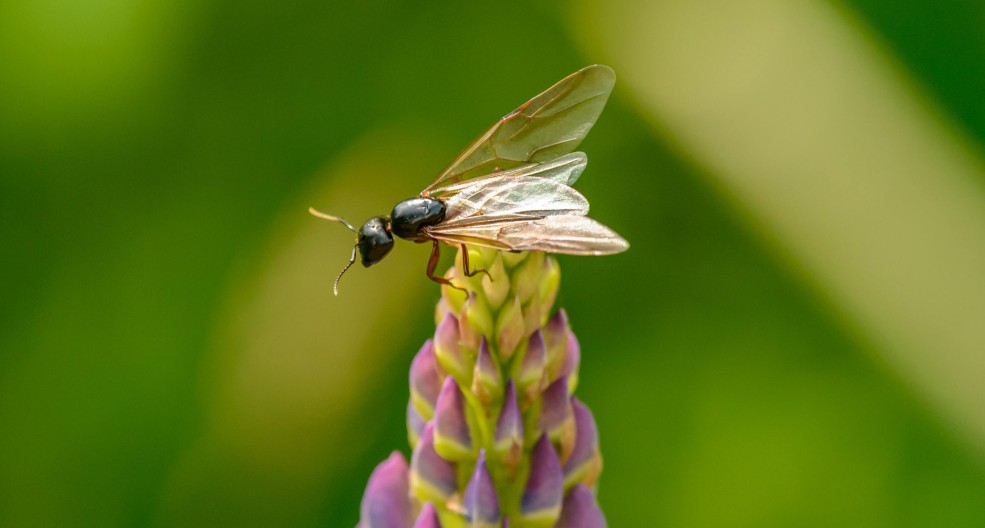Quick answer: Flying ant day 2025 will most likely be in July. For the past 8 years, flying ant day in the UK, has been in July. No one (except the ants) knows the exact date for flying ant day 2025 until it occurs.
But, the British concept of ‘flying ant day’ is a bit of a misnomer.
Flying ants, usually of the species Lasius Niger (commonly known as a black ant), can come out in swarms on pretty much any warm, calm day. As long as the wind speeds are less than 6.3 meters per second and temperatures are above 13 degrees Celsius it could be flying ant day. These weather conditions are non-negotiable for flying ants.
‘Flying Ant Day’ can differ from location to location, in line with the weather. According to our own research, the vast majority of flying ant activity is generally concentrated over a short time spans of just a few days each July, which explains the perception of “flying ant day”.
In July 2024, there was a small spike in flying ant activity on 11th July, followed by a very large spike in flying ants on the 17th and 18th of July.
Back in July 2023, the UK had three major spikes in flying ant activity, occurring on 7th, 18th and 27th of July. July 2023’s flying ant levels were less than in previous years. Over the past 8 years, all spikes in flying ant activity occurred in the month of July, only the specific dates varied from year to year.
With British summers being quite unpredictable and diverse weatherwise, it’s not always possible to predict when exactly Flying Ant Day will be. But using historic data we can determine that July is almost always ‘flying ant month’ across the vast majority of Britain.
Historic UK search engine data for the query ‘flying ants’, shows huge spikes occurring each July. The spikes in searches coincide with UK media reportings of flying ants.
These searches are spurred by people coming across swarms of flying ants and using search engines to get more information about them, so we can infer that the spikes in searches correspond to spikes in flying ant activity. Here is the five year chart showing searches for ‘flying ants’.
Below is a table showing the annual date ranges where levels of flying ant activity in the UK were the highest.
| Year | Flying ant annual peak |
| 2017 | 2nd – 8th July |
| 2018 | 1st – 7th July |
| 2019 | 21st -27th July |
| 2020 | 12th – 18th July |
| 2021 | 11th – 17th July |
| 2022 | 3rd – 16th July |
| 2023 | 7th – 28th July |
| 2024 | 11th – 20th July |
When is flying ant day 2025?
No one knows the exact dates of flying ant day 2025. It will most likely be in July, and the majority of UK flying ant activity will take place over a period of about 3-5 days.
Not all parts of the UK have their flying ant day at the same time. While most of the UK’s ant swarming happens over the same few days, there are smaller amounts of flying ants on pretty much every calm warm day in July, at least somewhere in the UK.
When was flying ant day 2024?
Flying ant day 2024 occurred between the 11th and 20th of July, with the by far the largest spike in flying ants activity taking places on the 17th and 18th of July. Most Brits, will have experienced flying ant day on either the 17th or 18th, however depending on your location, you may have witnessed this natural wonder on a different date.

Why flying ants fly?
Flying ants comprise new queen ants and male drone ants. These ants have wings. They leave their mother’s colony so that they can take to the skies to mate with other ants from other colonies.
The mating happens mid-flight during which the queens will mate with several males. This is called the ‘nuptial flight’.
Once fertilised by a male, the young female queen will find somewhere to start her own colony. When she’s found a suitable location, she’ll remove her own wings and get to work laying eggs for the rest of her days.
The eggs will hatch, giving birth to female worker ants.
These female worker ants will ensure the prosperity of the colony through the work they do. They will never grow wings or become queens. The following year, when weather permits, the queen will lay female queen ants that will have wings, and they too will leave the nest to mate and start their own colonies somewhere new, just like their mother did.
The sperm the queen received on her ‘nuptial flight’ will last her a lifetime, which can be up to 15 years. She will not mate again, and could spawn a colony as big as 20,000 ants.
The flying male ants will die within just a few days of the flight, having served their purpose.

